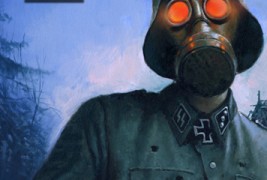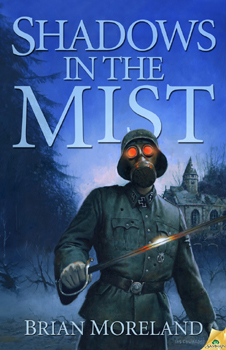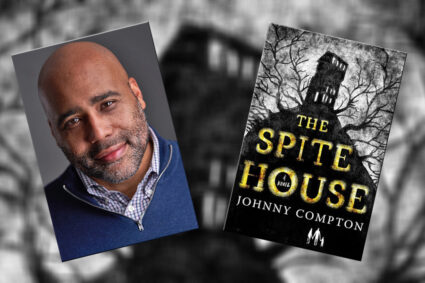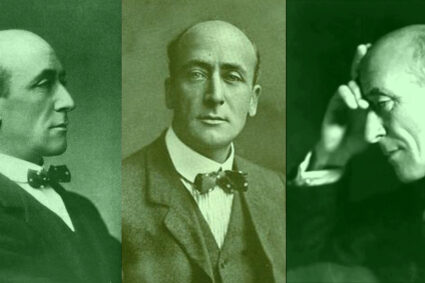
Setup vs. payoff. Horror fans, you know it well. Basically that means the shit you have to put up with to get to the good stuff. Horror, more than any other genre, sees a lot of crap put out to make a quick buck. Sure, roller disco aficionados have XANADU, and 14-year-old male boob enthusiasts have late-night Cinemax. But drama diehards don’t flock to the Cineplex to see the latest maudlin effort that Kevin Spacey’s wasting his talent on (“Please, mom, please, please please can we go to THE LIFE OF DAVID GALE? All my friends are!”). Although according to a recent scientific study that I’m making up as I type, 14-year-old-boys will sit through anything, however boring or even – gasp! – educational if there’s even the slimmest hope of getting the merest glimpse of a breast. Then there are the times when neither the setup nor the payoff works. That’s what we have in the case of SHADOWS IN THE MIST by Brian Moreland (Samhain Publishing).
Moreland has a pretty good premise – a group of soldiers, in the waning days of World War II, comes across some sort of Nazi supersoldiers of a decidedly non-Steve Rogers variety. Throw in a bunch of late-arriving mystical mumbo-jumbo and that’s basically it. There aren’t any significant subplots, or parallel lines of action, or much else to worry about other than the American soldiers fighting the seemingly unkillable Supernazis (my term, not his).
The plot is pretty simple. Lieutenant Jack Chambers takes over his regiment when his captain dies. Just before the captain passes away, he instructs Chambers to complete his mission, and hands Chambers a small square cross. At the moment the exchange happens, a wounded Chambers believes that he sees a bright flash of light just before passing out. When he wakes up, there’s a tattoo of the cross on his hand. He doesn’t know what the mission is, just that he’s been entrusted to complete it.
Chambers had been hoping his unit could go home, that the war would be over for them, but instead they find themselves on one last, and possibly suicidal, mission with a mysterious group of commandoes. This unit is made up of a Czech captain, a group of corporals, and a lieutenant who knows – and hates – Chambers.
The mission leads them through a small town and eventually to a church where the Germans had been headquartered. Along the way the Americans encounter more of the Supernazis, and a whole score of regular dead Nazis. In the church, Chambers and his men discover the truth about what the Supernazis are, and possible ways to kill them.
The answers involve the Ahnenerbe (think the Nazi archeologists in RAIDERS OF THE LOST ARK), and Jewish mysticism, and betrayals, and lots of other stuff that’s familiar in a post-RAIDERS/HELLBOY world. After Chambers succeeds in dispatching the Supernazis during the war, things are tied up with a sentimental ending set in the present day.
Moreland writes with undeniable enthusiasm, and he’s certainly done his research on the Nazi mysticism angle. But sometimes his writing seems too enthusiastic, like he’s trying too hard. Rather than letting the writing flow, at times he reaches for word choices that are inappropriate or flat out incorrect, and this leads to syntactical errors and lends the book a sometimes amateurish air. Even his research, rather than always being a strength, ends up often being a detriment, since he throws in way too much backstory and mythology, all of it in the last 50 or so pages, and most of it way too convoluted.
This is a book I wanted to like a whole lot more than I did. As I said, Moreland clearly has great passion for what he’s writing, but it’s a passion that never translates to the page. The central premise of American GIs fighting unkillable Supernazis remains sadly underdeveloped. I never cared about the characters, nor did I ever view them as more than 2-dimensional props, although they were meant to be more than that. The first 200 or so pages of SHADOWS move very slowly, and very repetitively. The battles that Chambers and his men fight have a sameness to them, and beyond the Supernazis being unkillable, we don’t learn anything new about them for a long, long time.
The story would have worked better if it had done one of two diametrically opposed things: either double down on the latent pulpiness of the story and really go over the top with it, or deepen the characterizations and interactions to make the emotional denouement work. The first choice would yield something like Samuel-Fuller-meets-H.P.-Lovecraft, and the second would be more along the lines of Neil Marshall’s DOG SOLDIERS, a work I wish this book had more in common with.
The book, as currently written, could stand to lose a hundred pages to trim the considerable fat. Although it’s not the length that’s the problem; the problem is that the author doesn’t use the length of the book to his advantage. It’s about the one thing, fighting the Supernazis. In any supernatural thriller type work, the information has to be doled out regularly, lest you lose or – worse – piss off your audience. But we’re made to wait, and wait, and keep on waiting, before we start getting concrete information about the supernatural threat.
The final verdict on this is that the setup of SHADOWS IN THE MIST takes too long to get anywhere, and when it does, the payoff is underwhelming. Brian Moreland seems like a guy who cared deeply about the story he was telling, I just wish he had taken more time to get us to care too.















